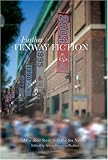Michael Joyce is a master at evoking a sense of loss, memory and how unreliable it can be (the line from “afternoon, a story,” the seminal hyper fiction, is a great example: “I want to say I may have seen my son die this morning.”), and connections.
 When I read fiction by Joyce I’m most often reminded of someone who’s woven a fine tapestry. Or a rug. He leaves out the strands from the finished cloth for you, the reader, to grab a hold of, and sometimes he’s woven them in tightly, and it takes some work to ferret them out, to realize that you are slowly unraveling the whole story. In a story like “Twelve Blue” he just comes right out and shows you the story that way, the threads running alongside the text you’re reading and you can leap from strand to strand like some reading, hyper monkey. It’s a method of storytelling he can’t help but do.
When I read fiction by Joyce I’m most often reminded of someone who’s woven a fine tapestry. Or a rug. He leaves out the strands from the finished cloth for you, the reader, to grab a hold of, and sometimes he’s woven them in tightly, and it takes some work to ferret them out, to realize that you are slowly unraveling the whole story. In a story like “Twelve Blue” he just comes right out and shows you the story that way, the threads running alongside the text you’re reading and you can leap from strand to strand like some reading, hyper monkey. It’s a method of storytelling he can’t help but do.
I’d just finished reading The Genie at Low Tide (Ploughshares Solos) [http://savannahnow.com/arts/2013-09-05/story-savannah-author-released-prestigious-digital-first-series#.Ul837xZYV7H], which is another excellent piece of baseball fiction about a retired pitcher with an angel of mercy appearing on his doorstep, when I got an email from Michael Joyce regarding the re-publication of his novel “Going the Distance.” I used to be an assistant in some of Michael’s classes at Vassar College back in the day, and I consider him a friend and mentor, so I may be a little biased. “The War Outside Ireland” is one of my favorite all-time books, and I’ve collaborated on a web-based hyper fiction called “The Sonatas of Saint Francis” with Michael and his wife and Andrea Morris. But…
“Going the Distance” is an amazing book. You’re left, along with the protagonist, Jack Flynn, to unravel just what it is he’s doing in way upstate New York with Emma, how he got there, what has happened to his family, his career, and even his fans. Michael portrays an ex-pitcher and the era in which he pitched, the people with whom he shared a clubhouse or field so well you forget, for a second, that Jack Flynn is a fictional pitcher, teammate of Sidd Fynch, for all intents and purposes. I loved these sequences and got lost in the intricacies of how a pitcher thinks about the count: “People misunderstood. Oh-and-two was commonly thought a pitcher’s pitch; it wasn’t, not always, not even usually with the good ones.” You could feel how a pitcher thinks, feels, out there, all alone on the mound, even as Jack’s arm begins to feel the toll of all those violent motions, plate-wards.
Let’s just say I’m a sucker for baseball fiction, whether I’m writing it or reading it. But there has been plenty of commentary on how the game lends itself to literature, and Joyce, himself, quotes from A. Bartlett Giamatti’s “The Green Fields of the Mind” to kick the whole thing off, which is the where I’ll leave the analysis of baseball as a suitable fictional setting:
“The game begins in the spring, when everything else begins again, and it blossoms in the summer, filling the afternoons and evenings, and then as soon as the chill rains come, it stops and leaves you to face the fall all alone.”
But what makes the book amazing is that that’s just one thread. It could stand as a pretty good book all on its own as a baseball story, if that were all there were to it. But he weaves in Emma’s story, Wolfman, Restless, the story of aunt Bertie, living life in front of the TV, the story of the whole of Jack’s family, left behind in North Country New York along the river, fastened to the river, it seems, which becomes a character in its own right.
It’s a beautiful, lyrical novel, and well worth your time as the baseball season draws towards its conclusion. Or anytime, really.




